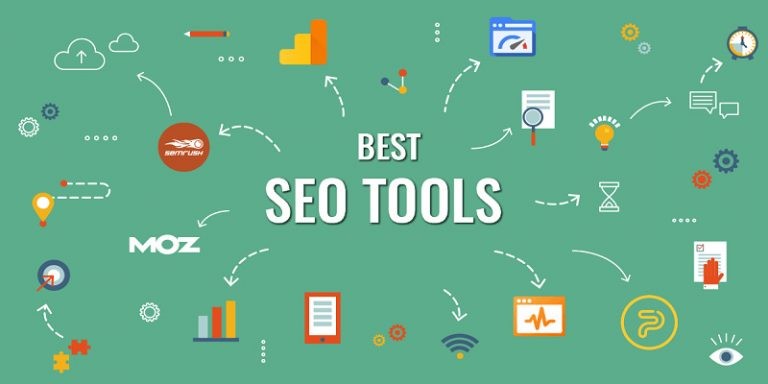Search Engine Optimization (SEO) is an essential aspect of online marketing. SEO helps your website get ranked higher on search engine results pages (SERPs), which in turn drives more traffic to your website. However, SEO can be a challenging task to accomplish, especially if you don’t have the right tools. Thankfully, there are numerous SEO tools available to make your life easier. In this article, we’ll discuss the best SEO tools for better research, reporting, and workflow.
Keyword Research Tools
Keyword research is the foundation of any successful SEO campaign. Without proper keyword research, it’s impossible to determine what keywords your target audience is searching for. Here are some of the best keyword research tools available:
- Google Keyword Planner: Google Keyword Planner is a free tool that helps you find keywords related to your business. You can enter a keyword, and the tool will show you search volumes and suggested bid prices for that keyword. The tool also shows you related keywords that you might not have considered.
- Ahrefs: Ahrefs is a premium SEO tool that offers comprehensive keyword research capabilities. Ahrefs allows you to analyze search volumes, competition, and related keywords. You can also see how many clicks a keyword is likely to generate and the estimated search traffic for that keyword.
- SEMrush: SEMrush is another popular keyword research tool that offers a range of features. The tool allows you to see keyword search volumes, competition, and trends. SEMrush also offers a feature called “Keyword Magic Tool,” which helps you find long-tail keywords that are easier to rank for.
Site Audit Tools
A site audit is a comprehensive analysis of your website to identify any technical SEO issues. Site audit tools help you identify and fix these issues, improving your website’s ranking on SERPs. Here are some of the best site audit tools available:
- Google Search Console: Google Search Console is a free tool provided by Google. The tool allows you to monitor your website’s performance, identify technical SEO issues, and fix them. You can also see which pages are ranking for specific keywords and identify any crawl errors.
- Ahrefs: Ahrefs also offers a site audit feature that allows you to identify technical SEO issues. The tool checks for broken links, duplicate content, and other common technical issues that can affect your website’s performance. Ahrefs also provides suggestions on how to fix these issues and improve your website’s overall SEO.
- Screaming Frog: Screaming Frog is a desktop-based site audit tool that allows you to crawl your website and identify any technical SEO issues. The tool checks for broken links, duplicate content, missing tags, and other technical issues. Screaming Frog also provides detailed reports on your website’s performance, allowing you to make informed decisions about your SEO strategy.
Backlink Analysis Tools
Backlinks are a crucial factor in SEO, as they signal to search engines that other websites trust your content. Backlink analysis tools help you identify the quality and quantity of backlinks to your website, allowing you to develop a strategy to improve your backlink profile. Here are some of the best backlink analysis tools available:
- Ahrefs: Ahrefs is a comprehensive backlink analysis tool that allows you to analyze your website’s backlink profile. The tool provides detailed reports on the quality and quantity of backlinks to your website, allowing you to identify any issues and develop a strategy to improve your backlink profile. Ahrefs also allows you to see which pages on your website have the most backlinks and which pages are linking to your website.
- Majestic: Majestic is another popular backlink analysis tool that provides detailed reports on your website’s backlink profile. The tool allows you to see the number of backlinks, referring domains, and anchor text used to link to your website. Majestic also provides a feature called “Trust Flow,” which measures the quality of the backlinks to your website.
- Google Search Console: Google Search Console also provides information on your website’s backlink profile. The tool shows you which websites are linking to your website and the anchor text used to link to your website. While not as comprehensive as Ahrefs or Majestic, Google Search Console is a useful tool for basic backlink analysis.
Rank Tracking Tools
Rank tracking tools allow you to monitor your website’s position on SERPs for specific keywords. This information is crucial in developing an effective SEO strategy. Here are some of the best rank tracking tools available:
- Ahrefs: Ahrefs offers a rank tracking feature that allows you to monitor your website’s position on SERPs for specific keywords. The tool provides detailed reports on your website’s ranking history, allowing you to identify trends and make informed decisions about your SEO strategy. Ahrefs also allows you to track your competitors’ rankings and compare them to your own.
- SEMrush: SEMrush also offers a rank tracking feature that allows you to monitor your website’s position on SERPs for specific keywords. The tool provides detailed reports on your website’s ranking history and allows you to track your competitors’ rankings. SEMrush also offers a feature called “Position Tracking,” which allows you to track your website’s ranking for multiple locations and devices.
- Google Search Console: While not as comprehensive as Ahrefs or SEMrush, Google Search Console allows you to monitor your website’s position on SERPs for specific keywords. The tool shows you the average position of your website for each keyword and the number of clicks and impressions your website has received.
- SERPWatcher: SERPWatcher is a rank tracking tool developed by Mangools. The tool allows you to track your website’s ranking for specific keywords and see how your ranking changes over time. SERPWatcher also offers a feature called “Keyword Groups,” which helps you organize your keywords and track them more effectively.
Reporting Tools
Reporting tools help you analyze your website’s performance and present your findings to clients or stakeholders. Here are some of the best reporting tools available:
- Google Data Studio: Google Data Studio is a free reporting tool that allows you to create customized reports using data from various sources, including Google Analytics and Google Search Console. The tool provides a range of visualization options and allows you to share your reports with others.
- DashThis: Dash is an excellent tool for reporting because it provides a platform for creating interactive and customizable data visualizations. With Dash, you can create dynamic and informative reports that allow your audience to explore data in real-time. Dash offers a wide range of customization options, including charts, tables, and maps, allowing you to create a report that fits your specific needs.
- Ahrefs: Ahrefs also offers a reporting feature that allows you to create custom reports using data from the tool. The tool allows you to create reports on keyword ranking, backlinks, and traffic.
- SEMrush: SEMrush also offers a reporting feature that allows you to create custom reports using data from the tool. The tool allows you to create reports on keyword ranking, backlinks, and traffic.
In conclusion, SEO is crucial for the success of any online business, and utilizing the right tools can make a significant impact on your SEO strategy. With the help of keyword research tools, site audit tools, backlink analysis tools, and rank tracking tools, you can optimize your website for search engines and attract more traffic to your website. It’s important to note that while these tools can simplify the process, they shouldn’t be relied on completely. SEO is an ongoing process that requires continuous effort, analysis, and adjustment. By combining these tools with a solid understanding of SEO best practices, you can improve your website’s ranking on search engine results pages and achieve your online business goals.






